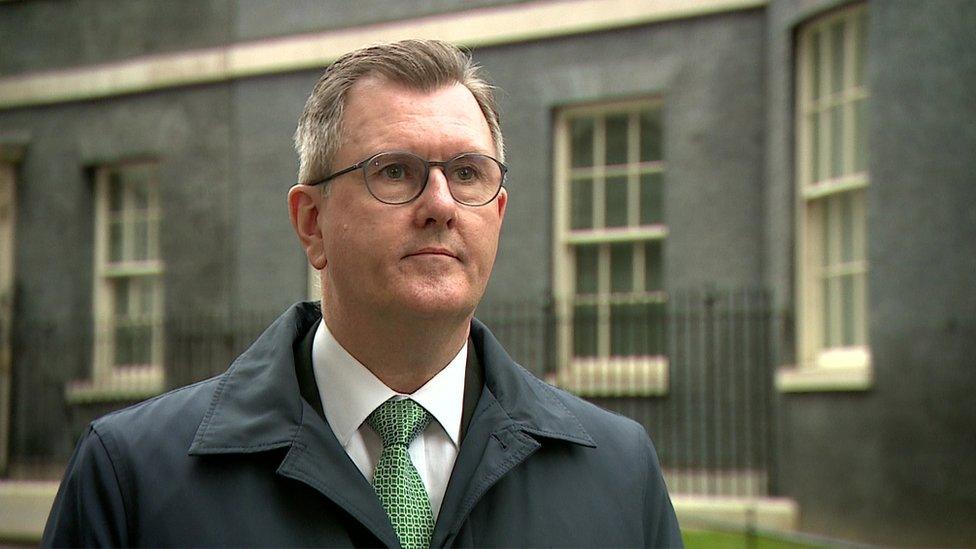Profile: Paul Givan's political career
- Published

Paul Givan is Northern Ireland's shortest serving first minister, having spent 231 days in office
Paul Givan has resigned as Northern Ireland's first minister as part of the Democratic Unionist Party's (DUP) protest against the Northern Ireland Protocol.
BBC News NI looks back at his time in office and political career.
How did he become first minister?
Mr Givan was appointed as Northern Ireland's youngest first minister last June after an internal DUP party revolt.
Edwin Poots, Stormont's agriculture minister, replaced Mrs Foster as DUP leader in May, having narrowly defeated Sir Jeffrey Donaldson in a leadership vote.
Mr Poots made it clear that he would split the roles of first minister and party leader, insisting one person could not do them both.
He nominated Mr Givan to be first minister but the vast majority of DUP assembly members - 24 to four - voted against his decision.
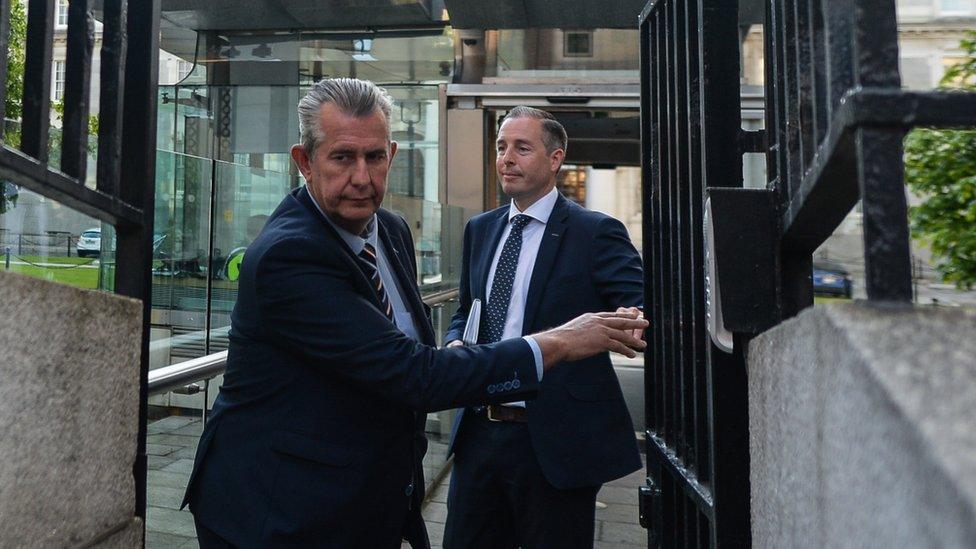
Edwin Poots nominated Paul Givan to be first minister after he became DUP leader
Mr Poots resigned after 21 days as DUP leader having lost the support of party colleagues over his decision to agree a deal with Sinn Féin and the UK government.
That deal was aimed at ending a stalemate over Irish language laws and ensure Paul Givan became Northern Ireland's first minister.
There was confusion over whether Mr Givan would retain his post after being informed that he would have to step down when Mr Poots resigned as party leader.
Mr Poots was replaced as leader by Sir Jeffrey, who allowed Mr Givan to continue as first minister.
Why did Paul Givan resign?
The DUP leader Sir Jeffrey Donaldson has previously made it clear he wanted to lead the party from Stormont as first minister.
Sir Jeffrey has threatened several times to pull the DUP ministers out of the executive if its demands over the Northern Ireland Protocol were not met.
In his first ultimatum on the issue in September, he warned the DUP might quit Stormont "within weeks".
He said DUP ministers would resign from their posts rather than implement further border checks on goods entering Northern Ireland from Great Britain.
Political beginnings
Paul Givan has said his first contact with politics came through working as a part-time assistant in Mr Poots' constituency and Stormont offices.
He became involved in the DUP after listening to an Ian Paisley speech at a rally in Kilkeel, County Down.

Paul Givan was co-opted in the Lagan Valley constituency in 2010
He's been associated with the so-called Paisley wing of the party ever since.
He previously served as a special adviser to Mr Poots, both when he was minister for the former Department of Culture, Arts and Leisure and when he was environment minister.
His own assembly career began in 2010, when he was co-opted in the Lagan Valley constituency to replace Sir Jeffrey Donaldson, who became an MP.
Prior to his appointment as first minister, he was chairman of the Stormont Justice Committee, although he has now been replaced in that role by party colleague Mervyn Storey.
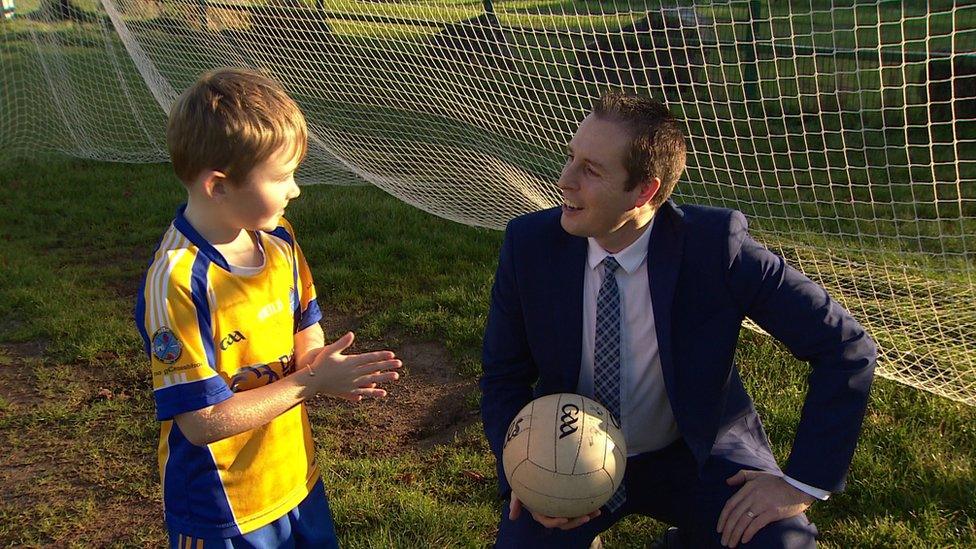
A keen soccer player, when Paul Givan visited a GAA club in 2016 it was the first time the sports minister had kicked a Gaelic football
He famously visited a Lisburn GAA club where the keen soccer player swapped codes to score a point for the cameras.
He became communities minister in 2016, with his time in the post cut short by the collapse of Stormont in January 2017.
His department was responsible for the highly controversial decision to cut funding for a small Irish language bursary scheme called Liofa in December 2016, during the crisis over the botched RHI scheme.
It earned him the label "ignoramus" from Gerry Adams and is said by some to have been the final straw which helped to bring down Stormont in early 2017.
Paul Givan soon reversed the decision but it was too late.
Martin McGuinness resigned and devolution was suspended for three years.

Mr Givan was Northern Ireland's youngest - and shortest-serving - first minister
Paul Givan has a strongly socially conservative streak in common with his former party leader Edwin Poots.
In March, Mr Givan brought forward a Private Members Bill which sought to amend the law in Northern Ireland to prevent abortions in cases of non-fatal disabilities, including Down's Syndrome.
The bill was rejected by MLAS who voted by 45 to 42 to reject the principles of the bill after its consideration stage debate.
Related topics
- Published3 February 2022
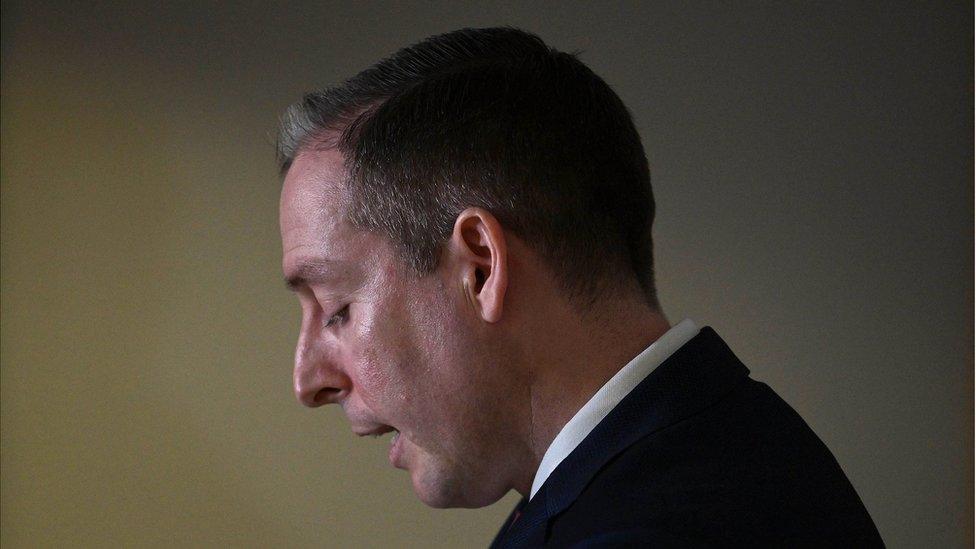
- Published3 February 2022
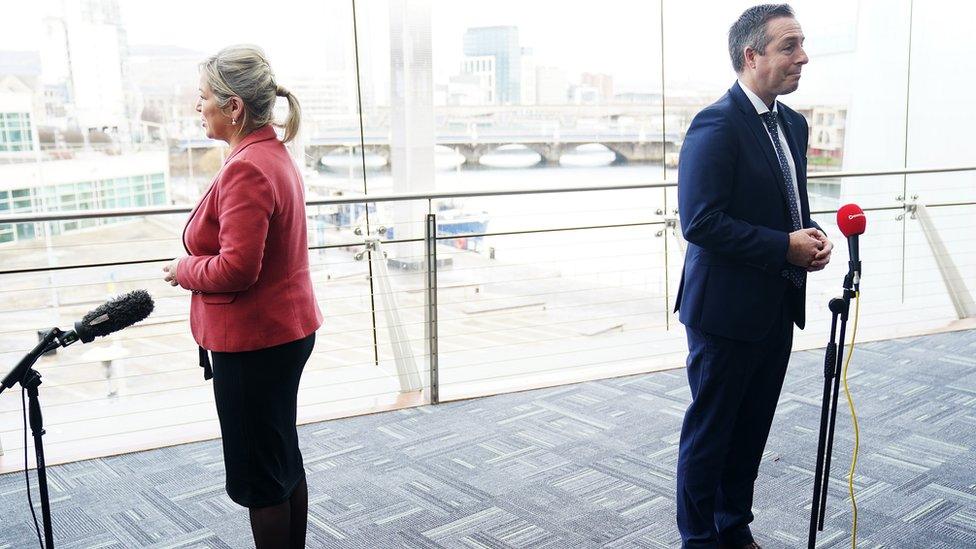
- Published26 January 2022
